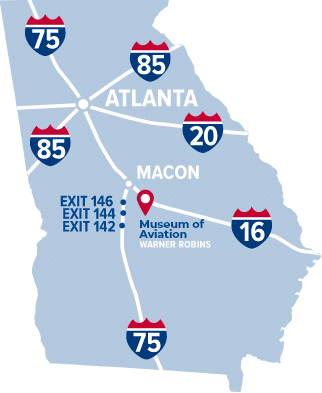This past weekend I had the privilege to sit down with two gentlemen, both veterans of World War II, and conduct oral history interviews with them. I have written before about the importance of oral histories, but these were the first actual interviews that I have done as the primary interviewer. The process was not completely new to me, as I have sat in on many interviews and in some cases helped conduct them, but this was a whole different experience. Both interviewees were very gracious and helpful. It can be an intimidating thing to invite a stranger into your home, sign legal release forms and then try to remember events of about 70 years ago. The gentlemen in question were both stationed at Cochran Army Airfield during World War II and their stories are remarkably different and yet share many commonalities. The most important thing about these stories however is that they are told in the direct voices of the ones who experienced them.
I grew up in the area local to the Museum of Aviation, in the northern part of Houston County. From the time I can remember anything, I remember my father talking about what he simply called Cochran Field. As a young farm boy from the small town of Wellston (modern day Warner Robins), the BT-13s, BT-15s and later AT-6s that were stationed at Cochran Field made quite an impression on him. To get an idea of how Cochran Field changed his life, imagine a young share-croppers son, very poor and whose days are full of hard manual labor. In the span of a few months Cochran Field opens, the first Royal Air Force (R.A.F.) cadets arrive for flight training and Pearl Harbor is bombed, thrusting the United States into war. This young boy’s quiet farming life is now right in the middle of a world with buzzing military aircraft complete with crashes, parachutes and men from overseas with strange accents. The young farm boy witnesses and experiences life and death, including assisting a cadet out of a pecan tree where he had parachuted and watching a cadet and instructor burn to death in a crashed airplane. Needless to say, he is changed forever by these experiences and his young son is changed by the stories he hears about a place called Cochran Field.
Fast forward many years and here I sit, hoping to do some small part to help chronicle the story of those young cadet pilots. As is often the case with a historian’s work, it is often too late to capture much of the story. Being a historian is committing your life to endlessly trying to catch up to everything that needs to be documented and preserved. It can be maddening if you let it. Cochran Field accepted its first flight class in 1941 and its last in 1945; only four short years. But those four years are important to local history here in Middle Georgia, to national history and to international history. As an almost-done graduate student, my thesis focuses on Cochran Field. I hope to capture the stories of both the men who served there and the local community that supported it. Many years have passed, and the opportunity to hear those stories first-hand is quickly passing.
I plan to write more about these interviews, how they have affected me and share some video clips from them if possible, in the coming months. For now the next step in the process is moving the interviews from tape to DVD and then transcribing them. I do have one short story to share now; one of the gentlemen I interviewed Saturday was an R.A.F. cadet and then instructor pilot at Cochran Field. In the post-war years this man made acquaintances with one Adolf Galland. For those with knowledge of World War II, the Luftwaffe (German Air Force) or general history this name probably rings a bell. For those whom it doesn’t, follow the link attached to the name to read about him or suffice to know that he was a well known and high ranking ace and officer in the German Luftwaffe during World War II. Follow my logic here for a minute: I shook hands with this gentlemen Saturday, who had shaken hands with Adolf Galland. That puts me one handshake away from one of the most well known German fighter aces of World War II. This excited me when my wife brought it to my attention. Then I started thinking about it a little deeper, if I was one handshake away from Adolf Galland, that means I was only two handshakes away from Adolf Hitler. While I hold no warm place in my heart for the man many consider to be evil personified, this is still seriously epic stuff for a historian. Something to think about! Until next time, enjoy this two part video series of flight training in a BT-13.
[youtube=http://www.youtube.com/watch?v=yP_UFWnhrDY] [youtube=http://www.youtube.com/watch?v=io-pHQKgXdE]











